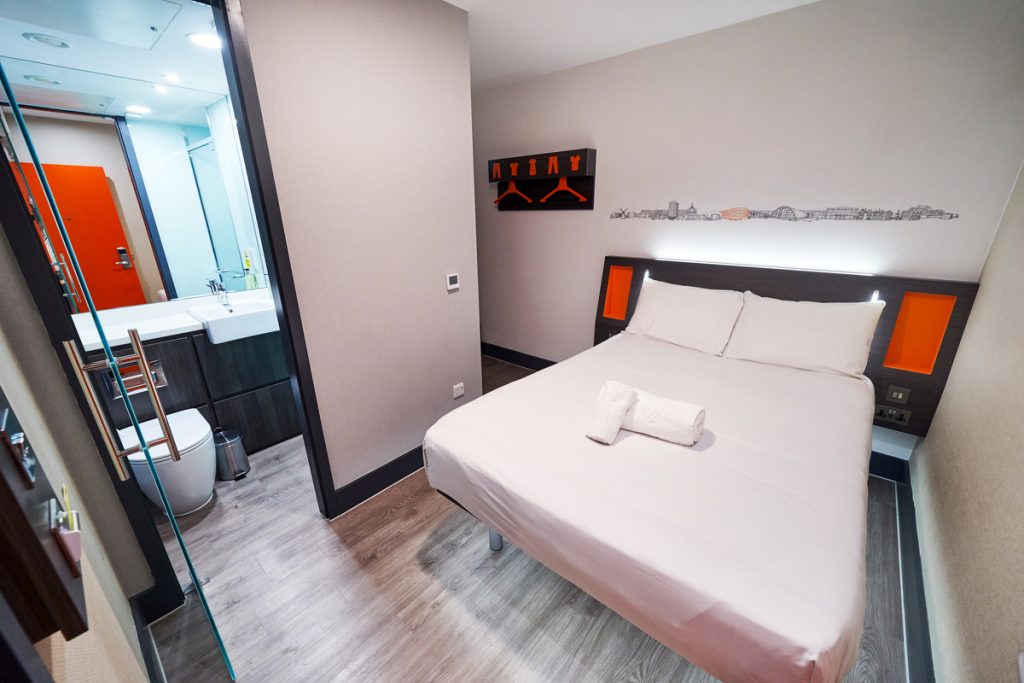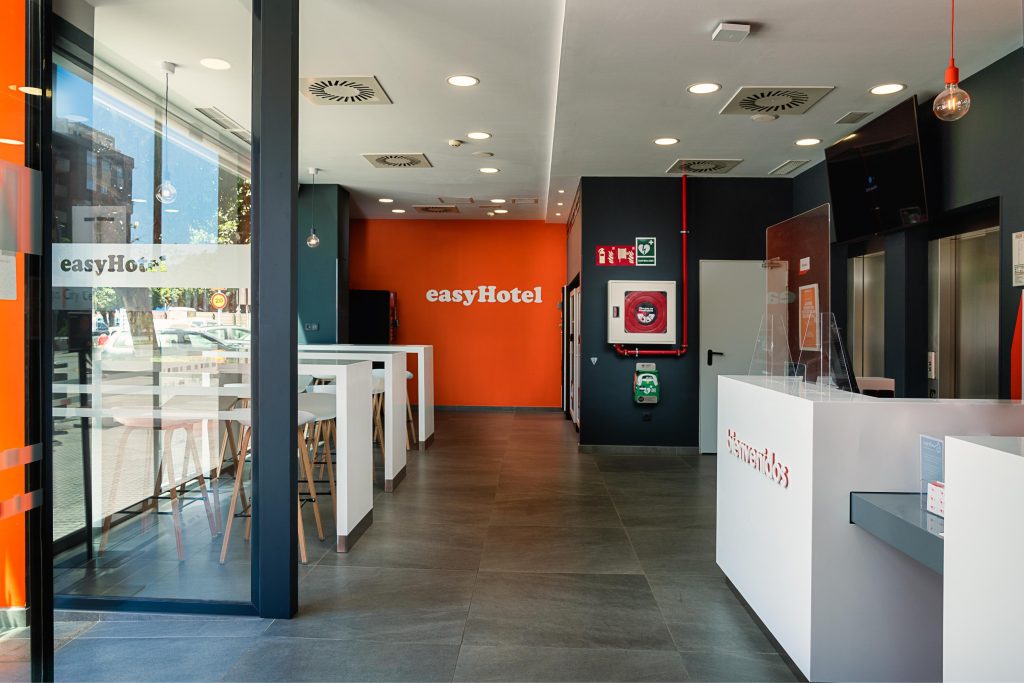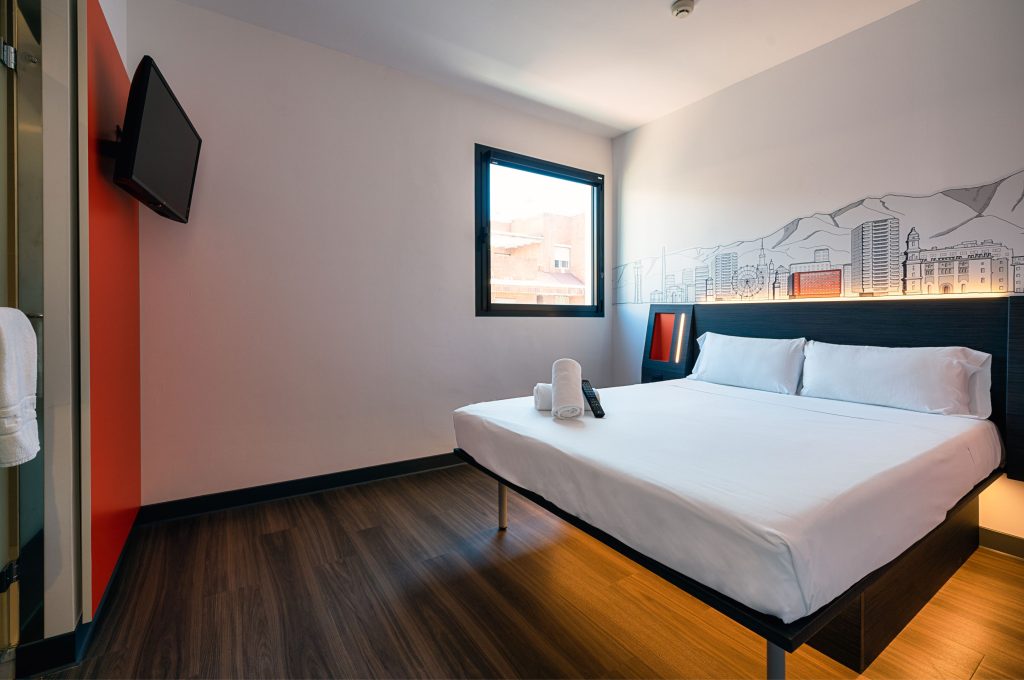Tourism is a vibrant industry in Europe, with history and character etched into the cobblestones of even its laziest streets. To some extent, this was facilitated by the creation of Sir Stelios Haji-Ioanno’s easyJet, which revolutionized air travel in Europe. St John Harvey, the franchise director for easyHotel, sees the brand as a natural progression of easyJet.

“It goes back to Sir Stelios, who in 1995, started the democratization of air travel with easyJet, with the intention of making getting there possible for everybody. Stripping unnecessary cost out of the business and just getting people from A to B safely and comfortably was the model. We’ve got exactly the same vision but this time it’s to stay.”
easyHotel took the same principles that made easyJet so attractive.
“The concept is very similar to what he [Sir Stelios Haji-Ioanno] did with easyJet, which was around everything you need for your stay; it needs to be safe, clean, comfortable, nothing more, nothing less. The genesis of easyHotel is very much on the back of the same ideas as easyJet,” he said.
Geography drives growth strategies
Many franchise brands try their hand at global growth early on, not knowing that it could potentially sink the entire brand if things don’t work out. It’s essential that franchises maintain a degree of control early on, and establish an identity and common process.
“People recognize what the brand does; it gives value for money. It provides all the basics that you need, no more or less”
While the brand may enjoy global recognition, restricting early growth to Europe and nearby territories has proven sustainable and successful.

“In terms of what guides our strategy and which markets we focus on, we’ve really honed that down to continental Europe and near neighbouring territories. When I first joined three and a half years ago, we were much wider in our ambitions,” he explained.
“The easy brand is recognized in countries far afield. But in terms of our ability to control the operations, even of the franchised hotels, we feel we stand a better chance of doing that effectively if the hotels are situated in continental Europe, or near neighbouring territories. Territories that are key travel destinations for not just tourists, but increasingly, the business fraternity as well.”
The easyHotel brand currently has 43 sites to its name, with 16 of those leased or owned by the brand itself, which represents around 2,000 rooms. The remaining 27 are franchised locations, which are hotels that have signed up to the easyHotel system, which represents around 2,300 rooms.
This year, the brand has already opened in Paris and Zurich, but has more in the pipeline. In 2023, easyHotel plans to open in Dublin, Tel Aviv and Marrakesh.
The power of the easy brand
The easy family of brands seems to grow year on year; we only recently spoke to Dennis Helderman of easyToolhire. The recognizability of the brand is a huge bonus and one that stems from easyJet’s ubiquity across the European continent since 1995. It’s, therefore, no surprise that consumers would opt for a brand they already know to do economy and budget effectively.
“There are nearly 100 permutations of the easy brand now, and we call it the easy family of brands and we’re very much a big part of that. That gives a good idea of how attractive the brand has become for people to invest in and scale their businesses under that particular brand,” he said.
The easyHotel brand is known for its competitive pricing and no-frills, stripped back services to reduce costs. While many may need high-quality service and an amenity-laden hotel, many just want the basics at the lowest cost possible.
“People recognize what the brand does; it gives value for money. It provides all the basics that you need, no more or less,” he said.
“When easyJet disrupted the travel market, it took some getting used to. Passengers lamented the lack of service, but after a while, they actually got the gig and said yes. easyHotel’s offering is based on three brand pillars: super price, super sustainable and super easy.
“Our guests are not interested in exploring the hotel, all they want is a clean, safe and comfortable room to use as a springboard to get out and discover the city and get on with their trip at the other end. It’s why they took to our tagline ‘and the City is Yours’.”
Amenity creep
Budget and economy brands have become less and less budget over the years as they add more features to their hotels; a phenomenon known as ‘amenity creep’ in the hospitality industry. This increases costs for the hotelier, which are inevitably passed onto customers. That’s something easyHotel has recognized, and sees it as a gap it can fill.

“If you go back over the last 10 or 15 years in the budget sector, you’ve seen a phenomenon called ‘amenity creep’. If you take some of our key competitors in the U.K., they’ve increasingly added more facilities, more services, and that leads to a higher price,” he said.
“I wouldn’t say they’ve vacated the space but what they’ve done is upscaled their product a little bit, so they no longer inhabit the price point that they once used to. We’ve jumped into the space that has been created. I wouldn’t be bold enough to say we’ve made it ours but we’ve been a disruptor in that.”
The higher end of the hospitality market is generally well-served and sophisticated in most markets, but the same is not true for budget and economy hotels. There aren’t many trusted, branded options for travellers to turn to.
“In terms of what guides our strategy and which markets we focus on, we’ve really honed that down to continental Europe and near neighbouring territories”
“In Morocco and Tel Aviv, for instance, they’re very well served at the top end of the market, lots of four or five-star offering. But, when you start to move into the budget sector, from a branding point of view, it probably doesn’t exist,” he said.
“If you want to go value for money, you either have to stay in a hostel or an unbranded accommodation, and that that involves an element of risk.”
easyHotel almost seems like a natural progression of the easyJet brand; its realistic goals and measures provide a strong recipe for gaining a foothold and to some extent, re-defining the economy/budget hospitality industry in Europe.



